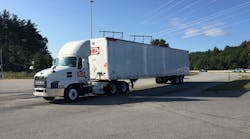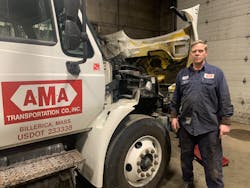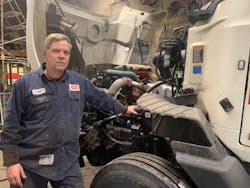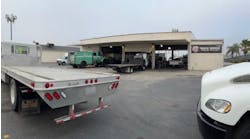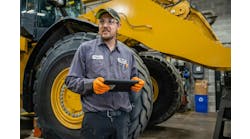If you had to sum up the shop operation at AMA Transportation, phrases like “self-sufficient” and “very effective” would come to mind. That is largely because service and repairs for the less-than-truckload carrier are guided and driven by a veteran mechanic. Bill Loyd, fleet manager for the company, not only brings decades of experience to bear on behalf of the fleet but a passion for getting the job done correctly as well.
Headquartered in Billerica, Massachusetts, AMA Transportation provides overnight LTL service 24 hours a day five days a week throughout New England and expanded service to metropolitan areas in New York, New Jersey, and Pennsylvania. Along with traditional LTL operations from its four terminals, the carrier offers warehousing services at a 30,000-sq ft facility.
The AMA company-owned fleet consists of about 50 Mack, International, and Freightliner day cabs and 15 International straight trucks, while additional power units based at a Connecticut location are leased from Penske and Ryder. Its 100 trailers include 28-, 45-, 48-, and 53-ft dry vans supplied by a mix of manufacturers.
“Leasing, and buying new tractors and trucks with extended warranties, has eased our service needs,” Loyd stated. “While we’re slowly moving away from performing major repairs and overhauls in-house, there’s plenty of routine maintenance to handle.”
At its main facility, the two-bay AMA shop is staffed by four technicians. Two mainly handle trailer and brake service, at night one technician performs PMs and minor repairs, and Loyd, an ASE certified Master Technician who refers to himself as the “head wrench,” takes on most diagnostics and major component repairs. At another one-bay facility in Northford, Connecticut, there is one technician who works on small items.
To diagnose vehicles, Loyd relies on various technologies, including the Premium tech Tool from Mack Trucks, Cummins INSITE, Navistar NED and ServiceMaxx, Detroit DDDL, and Bendix solutions. The plug and play technologies are accessed on a laptop that is always within Loyd’s reach.
“Everything we do comes through that computer,” Loyd said. “We also get electronic DVIRs that drivers complete on tablets so I’m immediately aware of any problem that is reported and we can move quickly to get it resolved.”
The driver vehicle inspection reports (DVIRs) are completed by drivers on the Acordex platform, which is integrated with the FACTS transportation and freight management system from Carrier Logistics Inc. AMA implemented the CLI solution last year to automate planning, operations, dispatch and communication, and documentation processes.
“We’re not big fans of sending any work out,” Loyd related. “We often fix problems on-site at terminals, and we have our own tow truck so we can bring vehicles needing repairs back ourselves if they’re within a reasonable distance. We also have agreements with towing companies when that service makes more sense. We will send out major trailer repairs and body work as well because of the high cost of performing those specialized services in-house.”
AMA also relies on dealers to meet its parts needs, including some vendor-owned inventory programs.
“We stick mainly with OEM replacement parts, but take advantage of fleet pricing whenever possible,” Loyd reported.
“We have select suppliers for tires as well,” Loyd explained further. “Locally, we use Sullivan Tire Commercial Truck Centers for Bandag retreads and we buy new tires from Corcentric and Pete’s Tire Barns. Price is a factor in where we purchase tires, but our decisions reflect finding the right tire for our application. We try different tires all the time and recently settled on General steer tires because they seem to hold up well in our city operations where there’s a lot of turning and scrubbing.”
Keeping a close eye on the AMA fleet for Loyd includes paying attention to CSA scores and roadside inspection violations in an effort to get ahead of potential problems.
“Trailer lighting is our biggest issue, but even then we’ve only had two actual citations on 100 units in the past five years,” he stated. “Being proactive, flexible and forward thinking, which stems from the way our family ownership runs and grows this business, pays off.
“In many ways,” Loyd admitted, “the approach to fleet maintenance at the AMA Transportation shop is old school but very effective. Above all else, we focus on doing what needs to be done to continually improve the fleet’s reliability, productivity, and efficiency.”
